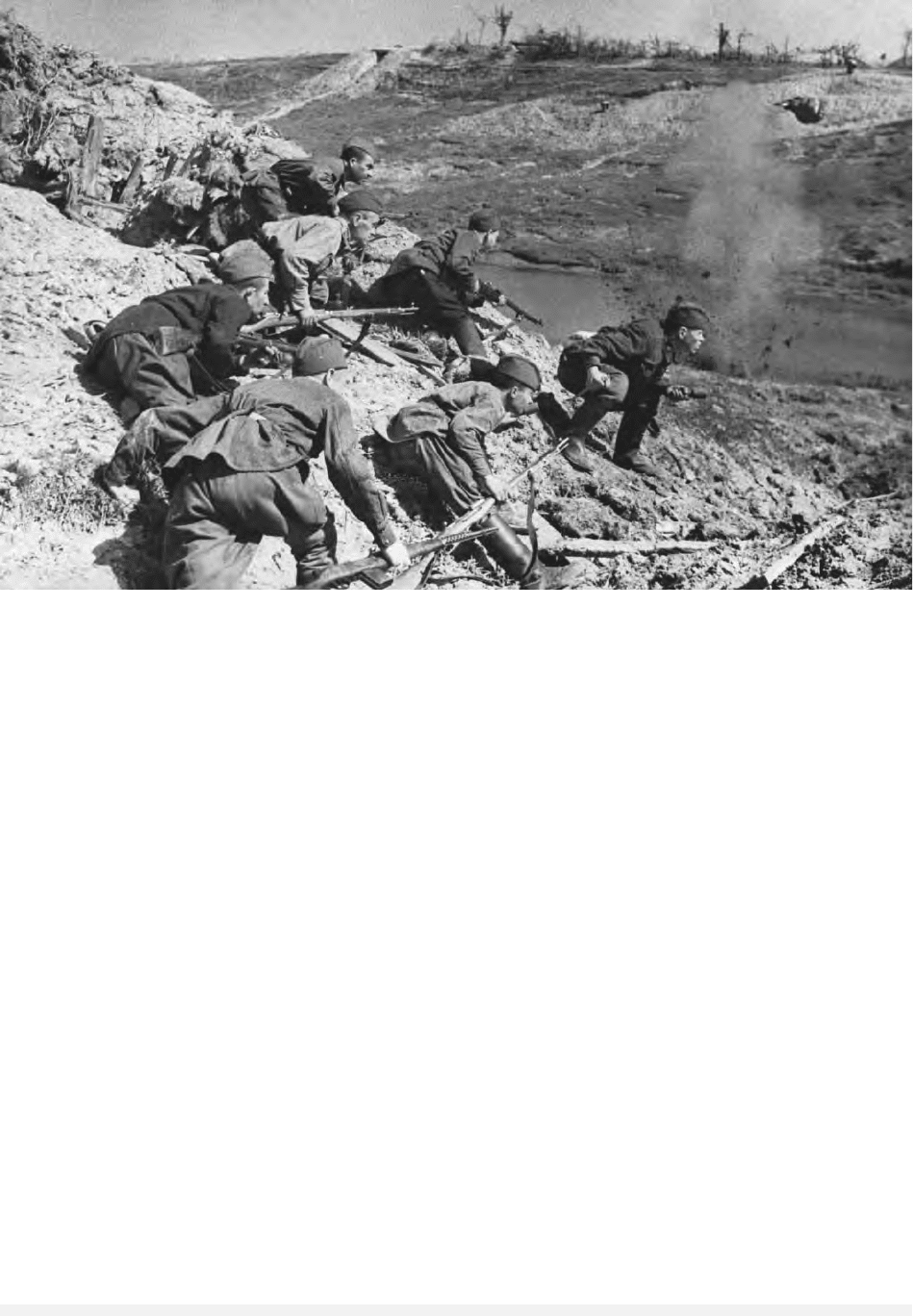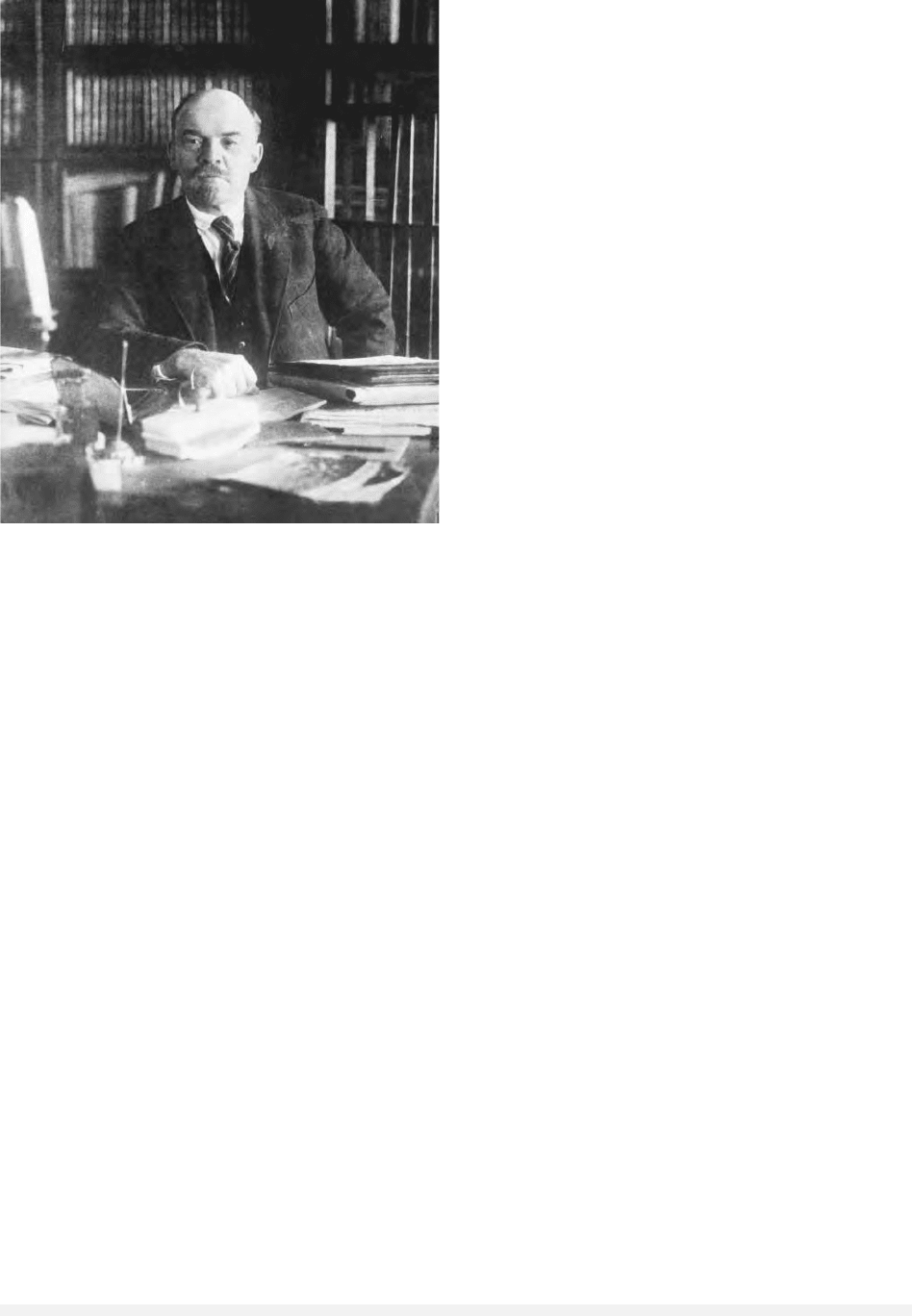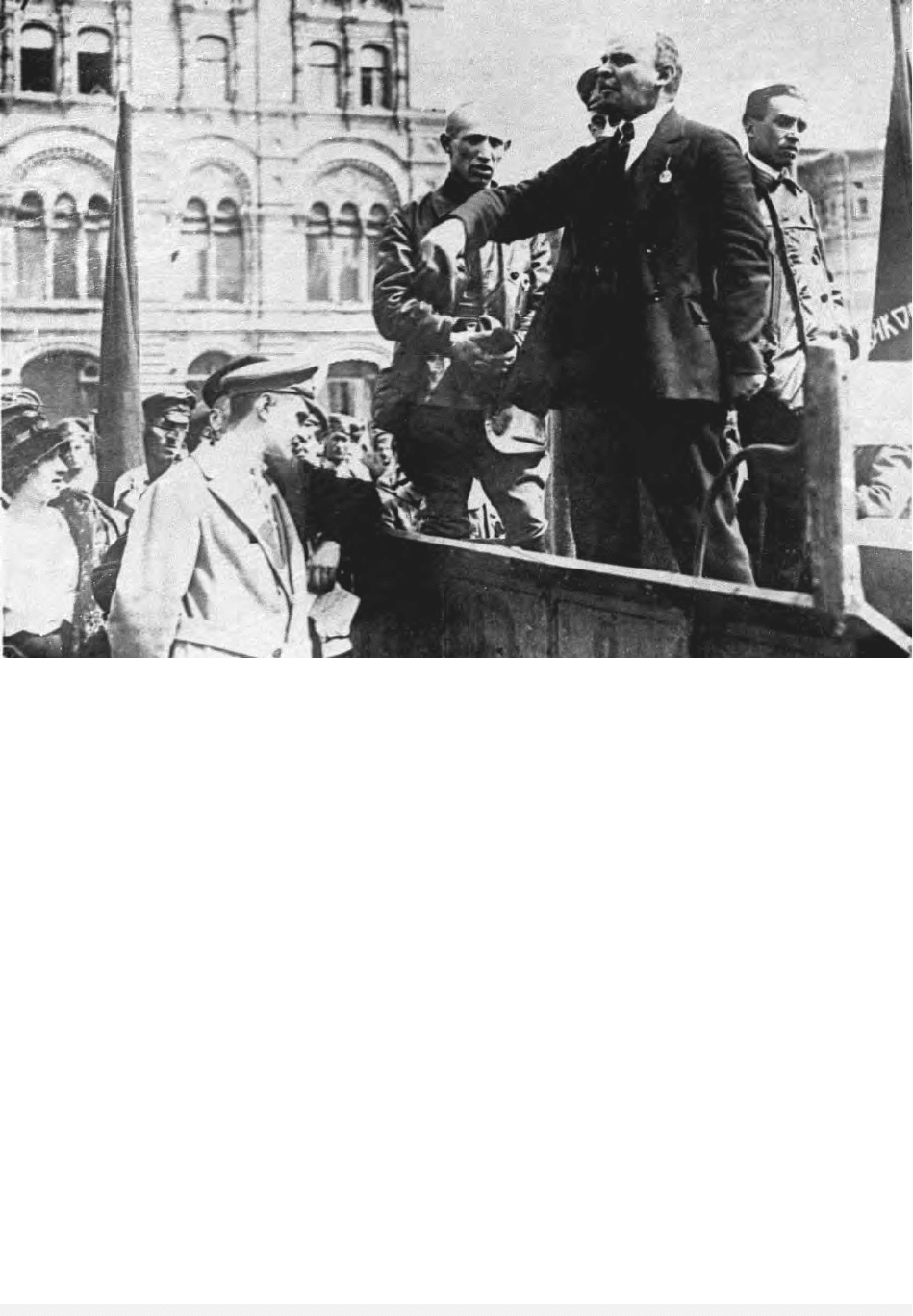Encyclopedia of Russian History
Подождите немного. Документ загружается.


rived in Moscow in 1685. There they established
the first formal educational institution in Russian
history, the Slavo-Greco-Latin Academy, and par-
ticipated in a heated debate known as the Eucharist
conflict, principally against Sylvester Medvedev.
They taught in the Academy until 1694, when they
were removed for attempted flight after a scandal
involving one of their relatives. After a brief stint
as translators in the Muscovite Printing Office and
as tutors of Italian, they were accused of heresy by
one of their former students. Between 1698 and
1706, they were transferred to various monaster-
ies, both in Moscow and in other towns, where
they continued their authorial activities. In 1706
they were sent to Novgorod and established a
school under the supervision of Metropolitan Iov.
In 1707 Sophronios was recalled to Moscow to
work in a Greek school there. Ioannikios taught in
Novgorod until 1716, when he joined his brother
in Moscow. After his brother’s death, Sophronios
continued his teaching activities until 1723, when
he became archimandrite of the Solotsinsky
monastery in Ryazan until his death. The two
brothers authored or coauthored many polemical
(anti-Catholic and anti-Protestant), philosophical,
and theological works, sermons, panegyrics, ora-
tions, and, most important, textbooks for their
students. A large part of these textbooks were adap-
tations of those used in Jesuit colleges. Through
their educational activities, the Leichoudes, though
Orthodox, imparted to their students the Jesuit in-
terpretation of Aristotelian philosophy, and the
Baroque culture of contemporary Europe. As such,
they contributed to the Russian elite’s westerniza-
tion and its preparedness to accept Peter the Great’s
own westernizing reforms.
See also: ORTHODOXY; RUSSIAN ORTHODOX CHURCH;
SLAVO-GRECO-LATIN ACADEMY; WESTERNIZERS
BIBLIOGRAPHY
Chrissidis, Nikolaos A. (2000). “Creating the New
Educated Elite: Learning and Faith in Moscow’s
Slavo-Greco-Latin Academy, 1685–1694.” Ph.D.
dissertation, Yale University, New Haven, CT.
N
IKOLAOS
A. C
HRISSIDIS
LEIPZIG, BATTLE OF
The “Battle of Nations” near Leipzig between allied
Russian, Prussian, Austrian, and Swedish armies
against Napoleon’s army from October 16 to 19,
1813.
Napoleon’s army (approximately 200,000
troops, 747 field guns), concentrated near Leipzig,
faced four allied armies, totaling 305,000 troops—
125,000 of them Russian, 90,000 Austrian, 72,000
Prussians, 18,000 Swedes—and 1,385 field guns.
The battle took place on a plain near Leipzig on Oc-
tober 16, mainly on the grounds of the Bohemian
army (133,000 men, commanded by the Austrian
field marshal Karl Schwarzenberg), which ap-
proached the city from the south. Napoleon tried
to defeat the coalition armies one by one. He con-
centrated 122,000 men against the Bohemian
army, and 50,000 under the command of marshal
Michel Ney against the Silesian army (60,000 men,
commanded by the Prussian general Gebhardt
Blücher), attacking from the north.
The opposing sides’ positions did not suffer
much change by the end of the day. Casualties
turned out to be relatively even (30,000 each), but
the allies’ casualties were compensated with the ar-
rival of the North army (58,000 men, commanded
by Karl–Juhan Bernadotte) and the Polish army
(54,000 men, commanded by Russian general
Leonty Bennigsen) on October 17. Meanwhile,
Napoleon’s army received a mere 25,000 men as a
reinforcement.
On the morning of October 18, the allies at-
tacked Napoleon’s positions. As a result of a fierce
battle, they gained no significant territorial advan-
tage. The allies, however, sent only 200,000 men
to battle, while 100,000 more were kept in reserve.
The French, meanwhile, had nearly exhausted their
ammunition. On the night of October 18,
Napoleon’s armies were drawn back to Leipzig, and
began their retreat in the morning. In the middle
of the day on October 19, the allies entered Leipzig.
Napoleon’s losses at Leipzig amounted to
100,000 men killed, wounded, and taken captive,
and 325 field guns. The allies lost approximately
80,000 men, of them 38,000 Russians. The allied
victory at Leipzig led to the cleansing of the terri-
tories of Germany and Holland of Napoleon’s
forces.
See also: NAPOLEON I
BIBLIOGRAPHY
Nafziger, George F. (1996). Napoleon at Leipzig: the Bat-
tle of Nations, 1813. Chicago, IL: Emperor’s Press.
LEIPZIG, BATTLE OF
843
ENCYCLOPEDIA OF RUSSIAN HISTORY

Smith, Digby George. (2001). 1813, Leipzig: Napoleon and
the Battle of the Nations. London: Greenhill Books;
Mechanicsburg, PA: Stackpole Books.
O
LEG
B
UDNITSKII
LENA GOLDFIELDS MASSACRE
The Lena Goldfields Massacre of April 4, 1912,
shook Russian society and rekindled the revo-
lutionary and workers’ movements after the
post–1905 repression. The shooting occurred dur-
ing a strike at the gold fields on the upper branches
of the Lena River to the northeast of Lake Baikal.
The Lena Goldfields Company, owned by promi-
nent Russian and British investors, had recently es-
tablished a monopoly of the region’s mines, which
produced most of Russia’s gold. Individuals of the
highest government rank held managerial positions
in the company. The fact that Russia’s currency
was on the gold standard further enhanced the
company’s significance. Especially after the joint
shocks of the Russo–Japanese War and the Revo-
lution of 1905, the ruble’s health in association
with renewed economic expansion vitally con-
cerned the imperial government. When the strike
broke out during late February 1912 in protest of
generally poor conditions, the government and
company officials in St. Petersburg naturally
wished to limit the strike. These hopes were frus-
trated by a group of employees and workers,
political exiles with past socialist and strike expe-
rience, who provided careful advice to the strikers.
Consequently, the workers avoided overstepping
the boundaries of legal strike activity. Company of-
ficials refused to meet the main strike demands, in-
cluding a shorter workday and higher pay.
Workers, whose patience had been tried by repeated
company violations of the work contract and ex-
isting labor laws, as confirmed by the chief min-
ing inspector and the governor of Irkutsk province,
refused to end the strike without real concessions.
Working closely with company officials, the
government sent a company of soldiers to join the
small contingent already on duty near the mines
and finally, after all negotiations failed, decided to
break the five–week impasse by arresting the strike
leaders. This ill–advised action carried out on April
3 only strengthened the workers’ resolve. On April
4, a large crowd of unarmed miners headed for the
administration building to petition for the release
of the leaders. Alarmed by the sudden appearance
of four thousand workers, police and army offi-
cers ordered the soldiers to open fire. Roughly five
hundred workers were shot, about half mortally.
Subsequently, the official government investigative
commission under Senator Sergei Manukhin
blamed the company and high government officials
both for the conditions that underlay the strike and
for the shooting.
The shooting unleashed a firestorm of protest
against the government and the company, includ-
ing in the press and in the State Duma. Especially
damaging were accusations of collusion between
state and company officials aimed at using force to
end the peaceful strike. Even groups normally sup-
portive of the government levied a barrage of crit-
icism. On a scale not seen since 1905, strikes broke
out all over Russia and did not cease until the out-
break of World War I. The revolutionary parties
also swung into action with leaflets and demon-
strations. The oppositionist movement found its
cause inadvertently aided when Minister of the In-
terior Nikolai Makarov asserted to the State Duma
about the shooting: “Thus it has always been and
thus it will always be.” This phrase, which caused
an additional firestorm of protest, seemed to sym-
bolize the government’s stance toward laboring
Russia. Spurred by the shooting and the govern-
ment’s attitude, revolutionary activities again
plagued the tsarist regime, now permanently
stamped as perpetrator of the Lena Goldfields Mas-
sacre.
See also: OCTOBER REVOLUTION; REVOLUTION OF 1905;
WORKERS
BIBLIOGRAPHY
Melancon, Michael. (1993). “The Ninth Circle: The Lena
Goldfield Workers and the Massacre of 4 April
1912.” Slavic Review 53(3):766-795.
Melancon, Michael. (2002). “Unexpected Consensus:
Russian Society and the Lena Massacre, April 1912.”
Revolutionary Russia 15(2):1-52.
M
ICHAEL
M
ELANCON
LEND LEASE
Lend-lease was a system of U.S. assistance to the
Allies in World War II. It was based on a bill of
March, 11, 1941, that gave the president of the
United States the right to sell, transfer into prop-
erty, lease, and rent various kinds of weapons or
LENA GOLDFIELDS MASSACRE
844
ENCYCLOPEDIA OF RUSSIAN HISTORY

materials to those countries whose defense the pres-
ident deemed vital to the defense of the United
States itself. According to the system, the materi-
als destroyed, lost, or consumed during the war
should not be subject to payment after the war.
The materials that were not used during the war
and that were suitable for civilian consumption
should be paid in full or in part, while weapons
and war materials could be demanded back. After
the United States entered the war, the concept of
lend lease, originally a system of unidirectional U.S.
aid, was transformed into a system of mutual aid,
which involved pooling the resources of the coun-
tries in the anti-Hitler coalition (known as the con-
cept of “pool”). Initially authorized for the purpose
of aiding Great Britain, in April 1941 the Lend-Lease
Act was extended to Greece, Yugoslavia, and China,
and, after September 1941, to the Soviet Union. By
September, 20, 1945, the date of cancellation of the
Lend-Lease Act, American aid had been received by
nearly forty countries.
During World War II, the U.S. spent a total of
$49.1 billion on the Lend-Lease Act. This included
$13.8 billion in aid to Great Britain and $9.5 bil-
lion to the USSR. Repayment in kind—called “re-
verse lend-lease”—was estimated at $7.8 billion, of
which $2.2 million was the contribution of the
USSR in the form of a discount for transport ser-
vices.
The Soviet Union received aid on lend-lease
principles not only from the United States, but also
from the states of the British Commonwealth, pri-
marily Great Britain and Canada. Economic rela-
tions between them were adjusted by mutual aid
agreements and legalized by special Allies’ proto-
cols, renewable annually. The First Protocol was
signed in Moscow on October, 1, 1941; the second
in Washington (October 6, 1942); the third in Lon-
don (September 1, 1943); and the fourth in Ottawa
(April, 17, 1945). The Fourth Protocol was added
by a special agreement between the USSR and the
United States called the “Program of October 17,
1944” (or “Milepost”), intended for supplies for use
by the Soviet Union in the war against Japan.
On the basis of those documents, the Soviet
Union received 18,763 aircraft, 11,567 tanks and
self-propelled guns, 7,340 armored vehicles and ar-
mored troop-carriers, more than 435,000 trucks
and jeeps, 9,641 guns, 2,626 radar, 43,298 radio
stations, 548 fighting ships and boats, and 62 cargo
ships. The remaining 75 percent of cargoes im-
ported into the USSR consisted of industrial equip-
ment, raw material, and foodstuffs. A significant
portion (up to seven percent) of supplies was lost
during transportation.
Most of the cargoes sent to the USSR were de-
livered by three main routes: via Iran, the Far East,
and the northern ports Arkhangelsk and Mur-
mansk. The last route was the shortest but also the
most dangerous.
After the war the United State cancelled all
lend-lease debts except that of the USSR. In 1972
the USSR and the United States signed an agree-
ment that the USSR would pay $722 million of its
debt by July 1, 2001.
See also: FOREIGN DEBT; WORLD WAR II; UNITED STATES,
RELATIONS WITH, NORTHERN CONVOYS
BIBLIOGRAPHY
Beaumont, Joan. (1980). Comrades in Arms: British Aid
to Russia, 1941–1945. London: Davis-Poynter.
Hall, H. Duncan; Scott, J. D., and Wrigley, C. C. (1956).
Studies of Overseas Supply. London: H. M. Stationery
Off.
Herring, George C. (1973). Aid to Russia, 1941–1946:
Strategy, Diplomacy, the Origins of the Cold War. New
York: Columbia University Press.
Jones, Robert Huhn. (1969). The Roads to Russia: United
States Lend-Lease to the Soviet Union. Norman: Uni-
versity of Oklahoma Press.
Van Tuyll, Hubert P. (1989). Feeding the Bear: American
Aid to the Soviet Union, 1941–1945. New York: Green-
wood Press.
M
IKHAIL
S
UPRUN
LENIN ENROLLMENT See COMMUNIST PARTY OF
THE SOVIET UNION.
LENINGRAD AFFAIR
The “Leningrad Affair” refers to a purge between
1949 and 1951 of the city’s political elite and of
nationally prominent communists who had come
from Leningrad. More than two hundred Lenin-
graders, including many family members of those
directly accused, were convicted on fabricated po-
litical charges, and twenty-three were executed.
Over two thousand city officials were fired from
their jobs. Hundreds from many other cities were
jailed during this purge.
LENINGRAD AFFAIR
845
ENCYCLOPEDIA OF RUSSIAN HISTORY

The “Leningrad Affair” derived largely from a
power struggle between Soviet leader Josef Stalin’s
two leading potential successors: Andrei Zhdanov,
Leningrad’s party chief during the city’s lengthy
wartime siege, and Georgy Malenkov, supported by
the head of the political police, Lavrenti Beria. Zh-
danov’s sudden death of apparent natural causes
in the late summer of 1948 left his protégés from
Leningrad vulnerable. In early 1949 Malenkov
charged that the Leningraders were trying to cre-
ate a rival Communist Party of Russia in conspir-
acy with another former Leningrad party chief,
Alexei Kuznetsov. Malenkov used as pretexts a
wholesale trade market that had been set up in
Leningrad without Moscow’s permission, as well
as alleged voting irregularities in a Leningrad party
conference. The Leningrad party members were
also charged with treason.
Aside from Kuznetsov, the most prominent vic-
tims of the “Leningrad Affair” were Politburo mem-
ber and Gosplan chairman Nikolai Voznesensky
and first secretary of the Leningrad party commit-
tee Pyotr Popkov. The three were shot along with
others on October 1, 1950. The purge signaled a
return to the violent and conspiratorial politics of
the 1930s. It eliminated the Leningraders as con-
tenders for national power and downgraded
Leningrad essentially to the status of a provincial
city within the USSR.
See also: BERIA; LAVRENTI PAVLOVICH; MALENKOV,
GEORGY MAKSIMILYANOVICH; ZHDANOV, ANDREI
ALEXANDROVICH; STALIN, JOSEF VISSARIONVICH
BIBLIOGRAPHY
Knight, Amy. (1993). Beria: Stalin’s First Lieutenant.
Princeton, NJ: Princeton University Press.
Volkogonov, Dmitri. (1991). Stalin: Triumph and Tragedy,
ed. and tr. Harold Shukman. New York: Grove Wei-
denfeld.
Zubkova, Elena. (1998). Russia After the War: Hopes, Il-
lusions, and Disappointments, 1945-1957, tr. and ed.
Hugh Ragsdale. Armonk, NY: M. E. Sharpe.
R
ICHARD
B
IDLACK
LENINGRAD, SIEGE OF
For 872 days during World War II, German and
Finnish armies besieged Leningrad, the Soviet
Union’s second largest city and important center
for armaments production. According to recent es-
timates, close to two million Soviet citizens died in
Leningrad or along nearby military fronts between
1941 and 1944. Of that total, roughly one million
civilians perished within the city itself.
The destruction of Leningrad was one of Adolf
Hitler’s strategic objectives in attacking the Soviet
Union on June 22, 1941. On September 8, 1941,
German Army Group North sealed off Leningrad.
It advanced to within a few miles of its southern
districts and then took the town of Schlisselburg
along the southern shore of Lake Ladoga. That
same day, Germany launched its first massive aer-
ial attack on the city. Germany’s ally, Finland,
completed the blockade by retaking territory north
of Leningrad that the Soviet Union had seized from
Finland during the winter war of 1939–1940.
About 2.5 million people were trapped within the
city. The only connection that Leningrad main-
tained with the rest of the Soviet Union was across
Lake Ladoga, which German aircraft patrolled. Fin-
land refused German entreaties to continue its ad-
vance southward along Ladoga’s eastern coast to
link up with German forces.
Hitler’s plan was to subdue Leningrad through
blockade, bombardment, and starvation prior to
seizing the city. German artillery gunners, together
with the Luftwaffe, killed approximately 17,000
Leningraders during the siege. Although supplies of
raw materials, fuel, and food dwindled rapidly
within Leningrad, war plants within the city lim-
its produced large numbers of tanks, artillery guns,
and other weapons during the fall of 1941 and con-
tinued to manufacture vast quantities of ammuni-
tion throughout the rest of the siege.
Most civilian deaths occurred during the win-
ter of 1941–1942. Bread was the only food that
was regularly available, and between November 20
and December 25, 1941, the daily bread ration for
most Leningraders dropped to its lowest level of
125 grams, or about 4.5 ounces. To give the ap-
pearance of larger rations, inedible materials, such
as saw dust, were baked into the bread. To make
matters worse, generation of electrical current was
sharply curtailed in early December because only
one city power plant operated at reduced capacity.
Most Leningraders thus lived in the dark; they
lacked running water because water pipes froze and
burst. Temperatures during that especially cold
winter plummeted to -40 degrees Farenheit in late
January. Residents had to fetch water from central
mains, canals, and the Neva River. The frigid
LENINGRAD, SIEGE OF
846
ENCYCLOPEDIA OF RUSSIAN HISTORY

winter, however, brought one advantage: Lake
Ladoga froze solid enough to become the “Road of
Life” over which food was trucked into the city,
and some 600,000 emaciated Leningraders were
evacuated.
During the spring and summer of 1942, those
remaining in Leningrad cleaned up debris and filth
from the previous winter, buried corpses, and
planted vegetable gardens in practically every open
space they could find. A fuel pipeline and electrical
cable were laid under Ladoga, and firewood and
peat stockpiled in anticipation of a second siege
winter. The evacuation over Ladoga continued, and
by the end of 1942 the city’s population was pared
down to 637,000. Repeated attempts were made in
1942 to lift the siege; yet it was not until January
1943 that the Red Army pierced the blockade by
retaking a narrow corridor along Ladoga’s south-
ern coast. A rail line was extended into the city,
and the first train arrived from “the mainland” on
February 7. Nevertheless, the siege would endure
for almost another year as German guns contin-
ued to pound Leningrad and its tenuous rail link
from close range. On January 27, 1944, the block-
ade finally ended as German troops retreated all
along the Soviet front.
Leningrad’s defense held strategic importance
for the Soviet Union. Had the city fallen in the au-
tumn of 1941, Germany could have redeployed
larger forces toward Moscow and thereby increased
the chances of taking the Soviet capital. Lenin-
graders who endured the horrific ordeal were mo-
tivated by love of their native city and country,
fear of what German occupation might bring, and
the intimidating presence of Soviet security forces.
In just the first fifteen months of the war, 5,360
Leningraders were executed for a variety of alleged
crimes, including political ones.
Relations between Leningrad’s leadership and
the Kremlin were tempestuous during the siege or-
deal. The city’s isolation gave it a measure of au-
tonomy from Moscow, and the suffering Leningrad
endured promoted the growth of a heroic reputa-
tion for the city. From 1949 to 1951 many of
Leningrad’s political, governmental, industrial, and
LENINGRAD, SIEGE OF
847
ENCYCLOPEDIA OF RUSSIAN HISTORY
Soviet troops launch a counterattack during the Nazi siege of Leningrad. © H
ULTON
-D
EUTSCH
C
OLLECTION
/CORBIS

cultural leaders were fired, and some executed, on
orders from the Kremlin during the notorious
Leningrad Affair.
See also: LENINGRAD AFFAIR; WORLD WAR II
BIBLIOGRAPHY
Glantz, David M. (2002). The Battle for Leningrad,
1941–1944. Lawrence: University of Kansas Press.
Goure, Leon. (1962). The Siege of Leningrad. Stanford, CA:
Stanford University Press.
Petrovskaya Wayne, Kyra. (2000). Shurik: A Story of the
Siege of Leningrad. New York: The Lyons Press.
Salisbury, Harrison. (1969). The 900 Days: The Siege of
Leningrad. New York: Harper & Row.
Simmons, Cynthia and Perlina, Nina, eds. (2002). Writ-
ing the Siege of Leningrad: Women’s Diaries, Memoirs,
and Documentary Prose. Pittsburgh, PA: University of
Pittsburgh Press.
Skrjabina, Elena. (1971). Siege and Survival: The Odyssey
of a Leningrader. Carbondale: Southern Illinois Uni-
versity Press.
R
ICHARD
B
IDLACK
LENIN LIBRARY See RUSSIAN STATE LIBRARY.
LENIN’S TESTAMENT
Lenin’s so-called Political Testament was actually a
letter dictated secretly by Vladimir Ilich Lenin in
late December 1922, which he intended to discuss
at the Twelfth Party Congress in April 1923. The
letter was initially known only to Lenin’s wife
Nadezhda Krupskaya and the two secretaries who
took down its contents. Unfortunately, on March
10, 1923, Lenin suffered a stroke, which put an
end to his active role in Soviet politics. It is widely
believed that Krupskaya, fearing that its contents
might cause further Party disunity, kept the testa-
ment under lock and key, until Lenin’s death in
January 1924. She then felt it safe enough to be
read to delegates at the Thirteenth Congress. All
those attending this Congress were sworn to keep
the contents of the letter a secret. It was then sup-
pressed in the Soviet Union, and so the document
did not appear in English until 1926.
A number of versions are currently in circula-
tion, each of which has been manipulated for po-
litical purposes, especially by those who wish to
criticize Josef Stalin or show how positively Leon
Trotsky was viewed by Lenin. Nevertheless it is
clear that Lenin was concerned in the Testament
with potential successors and that most of all he
favored Trotsky rather than his actual successor
Stalin. The Testament of December 29 indicates it
clear that Lenin wanted to avoid an irreversible split
in the Party and provides a balanced assessment of
all prospective candidates. With regard to Trotsky,
Lenin notes that “[as] his struggle against the CC
[Central Committee] on the question of the People’s
Commissariat has already proved, [he] is distin-
guished not only by outstanding ability. He is per-
sonally perhaps the most capable man in the
present CC, but he has displayed excessive self-
assurance and shown preoccupation with the
purely administrative side of the work.” Concern-
ing Stalin, by contrast, Lenin points out that he “is
too rude, and this defect, although quite tolerable
in our midst and in dealings among us Commu-
nists, becomes intolerable in a general secretary.
That is why I suggest that the comrades think
about a way of removing Stalin from that post and
appointing (sic) another man in his stead who in
all other respects differs from Comrade Stalin in
having only one advantage, namely, that of being
more tolerant, more loyal, less capricious, and so
forth.” In a postscript dated March 5, 1923, Lenin
criticizes Stalin for insulting Lenin’s wife and adds
that unless they receive a retraction and apology
then “relations between us should be broken off.”
In relation to other members of the CC, Lenin points
to the October episode in which Zinoviev and
Kamenev objected to the idea of an immediate
armed insurrection against the Provisional Gov-
ernment and also to Trotsky’s Menshevik past, but
he adds that neither should suffer any blame or
personal consequence.
Lenin was therefore extremely worried about
the degree of power Stalin had attained and thought
this was dangerous for the future of the Party and
Russia insofar as he was capable of abusing this
power. He advocated that Stalin be removed from
the post of general secretary. It is generally agreed
by historians that Trotsky’s failure to use the Tes-
tament was a major political mistake and an error
that allowed Stalin to rise to power. But it is also
conceded that Trotsky, in agreeing not to use it in
this manner, was abiding by Lenin’s wishes to
avoid a split. Trotsky therefore put Party unity be-
fore his own ambitions.
See also: LENIN, VLADIMIR ILICH; STALIN, JOSEF VISSARI-
ONOVICH; TROTSKY, LEON DAVIDOVICH
LENIN LIBRARY
848
ENCYCLOPEDIA OF RUSSIAN HISTORY

BIBLIOGRAPHY
Buranov, Yuri. (1994). Lenin’s Will: Falsified and Forbid-
den. Amherst, NY: Prometheus.
Volkogonov, Dmitri. (1994). Lenin: A New Biography.
New York: Free Press.
Wolfe, Bertram D. (1984). Three Who Made a Revolution:
A Biographical History. New York: Stein and Day.
C
HRISTOPHER
W
ILLIAMS
LENIN’S TOMB
Shortly after the death of Vladimir Ilich Lenin in
1924, and despite the opposition of his wife,
Nadezhda Krupskaya, Soviet leaders built a mau-
soleum on Moscow’s Red Square to display his em-
balmed body. The architect Alexei V. Shchusev
designed two temporary cube-shaped wooden struc-
tures and then a permanent red granite pyramid-
like building that was completed in 1929. The top
of the mausoleum held a tribune from which Soviet
leaders addressed the public. This site became the cer-
emonial center of the Bolshevik state as Stalin and
subsequent leaders appeared on the tribune to view
parades on November 7, May 1, and other Soviet
ceremonial occasions. When Josef V. Stalin died in
1953, his body was placed in the mausoleum next
to Lenin’s. In 1961, as Nikita Khrushchev’s attack
on Stalin’s cult of personality intensified, Stalin’s
body was removed from the mausoleum and buried
near the Kremlin wall. Lenin and his tomb, how-
ever, remained the quintessential symbols of Soviet
legitimacy.
Because of Lenin’s status as unrivaled leader of
the Bolshevik Party, and because of Russian tradi-
tions of personifying political power, a personality
cult glorifying Lenin began to develop even before
his death. The Soviet leadership mobilized the
legacy of Lenin after 1924 to establish its own le-
gitimacy and gain support for the Communist
Party. Recent scholarship has disproved the idea
that it was Stalin who masterminded the idea of
embalming Lenin, instead crediting such figures as
Felix Dzerzhinsky, Leonid Krasin, Vladimir Bonch-
Bruevich, and Anatoly Lunacharsky. It has also
been suggested that the cult grew out of popular
Orthodox religious traditions and the philosophical
belief of certain Bolshevik leaders in the deification
of man and the resurrection of the dead through
science. The archival sources underscore the con-
tingency of the creation of the Lenin cult. They
show that Dzerzhinsky and other Bolshevik lead-
ers consciously manipulated popular sentiment
about Lenin for utilitarian political goals. Yet this
would not have created such a powerful political
symbol if it had not been rooted in the spiritual,
philosophical, and political culture of Soviet lead-
ers and the Soviet people. More than a decade af-
ter the fall of communism, Lenin’s Tomb continued
to stand on Red Square even though there were pe-
riodic calls for his burial.
See also: CULT OF PERSONALITY; KREMLIN; KRUPSKAYA,
NADEZHDA KONSTANTINOVNA; LENIN, VLADIMIR
ILICH; RED SQUARE
BIBLIOGRAPHY
Tucker, Robert C. (1973). Stalin as Revolutionary,
1879–1929. New York: Norton.
Tumarkin, Nina. (1983). Lenin Lives! The Lenin Cult in So-
viet Russia. Cambridge, MA: Harvard University
Press.
K
AREN
P
ETRONE
LENIN, VLADIMIR ILICH
(1870–1924), revolutionary publicist, theoretician,
and activist; founder of and leading figure in the
Bolshevik Party (1903–1924); chairman of the So-
viet of People’s Commissars of the RSFSR/USSR
(1917–1924).
The reputation of Vladimir Ilich Lenin (pseu-
donym of V.I. Ulyanov) has suffered at the hands
of both his supporters and his detractors. The for-
mer turned him into an idol; the latter into a de-
mon. Lenin was neither. He was born on April 22,
1870, into the family of a successful school in-
spector from Simbirsk. For his first sixteen years,
Lenin lived the life of a child of a conventional, mod-
erately prosperous, middle-class, intellectual fam-
ily. The ordinariness of Lenin’s upbringing was first
disturbed by the death of his father, in January
1886 at the age of 54. This event haunted Lenin,
who feared he might also die prematurely, and in
fact died at almost exactly the same age as his fa-
ther. Then, in March 1887, Lenin’s older brother
was arrested for terrorism; he was executed the fol-
lowing May. The event aroused Lenin’s curiosity
about what had led his brother to sacrifice his life.
It also put obstacles in his path: As the brother of
a convicted terrorist, Lenin was excluded from
Kazan University. He eventually took a law degree,
LENIN, VLADIMIR ILICH
849
ENCYCLOPEDIA OF RUSSIAN HISTORY

with distinction, by correspondence from St Pe-
tersburg University in January 1892. However, his
real interests had already turned to serving the op-
pressed through revolution rather than at the bar.
All the indications suggest that Lenin was ini-
tially attracted to populism, and only later came
under the sway of Marxism. He joined a number
of provincial Marxist study circles, but first began
to attract attention when he moved to the capital,
St. Petersburg, and engaged in illegal political ac-
tivities among workers and intellectuals. In Febru-
ary 1894, he met fellow conspirator Nadezhda
Konstantinovna Krupskaya, who became his life-
long companion. After his first visit to Western Eu-
rope, in 1895, to meet the exiled leaders of Russian
Marxism, Lenin returned to St. Petersburg and
helped set up the League of Struggle for the Eman-
cipation of the Working Class. He was arrested in
December 1896 and, after prison interrogation in
St. Petersburg, was exiled to the village of Shushen-
skoe, in Siberia. Krupskaya, who was exiled sepa-
rately, offered to share banishment with him. The
authorities agreed, providing they married, which
they did in July 1898. Siberian exile, though rig-
orous in many respects, was an interlude of rela-
tive personal happiness in Lenin’s life. His lifelong
love of nature asserted itself in long walks, obser-
vation of social and animal life of the area, and fre-
quent hunting expeditions. He read a great deal,
communicated widely by letter with other social-
ists, and undertook research and writing. Direct po-
litical activity was not possible, and Lenin played
no part in the formation, in 1898, of the Russian
Social Democratic Workers’ Party (RSDLP), to
which he at first adhered to but from which he
later split. His term of exile ended in February,
1900. In July of that same year, he left Russia for
five years.
Up until that point much of Lenin’s political
writing, from his earliest known articles to his first
major treatise, The Development of Capitalism in
Russia, written while he was in Siberia, revolved
around the dispute between Marxists and populists.
The populists had proposed that Russia, given its
commune-based peasant class and underdeveloped
industry, could pass from its current condition of
“backwardness” to socialism without having to
first undergo the rigors of capitalist industrializa-
tion. Such a notion was an anathema to Lenin, who
believed the Marxist axiom that socialist revolution
could only follow from the overdevelopment of
capitalism, which would bring about its own col-
lapse. Lenin attacked the populist thesis in several
articles and pamphlets. The main theme of his trea-
tise on The Development of Capitalism in Russia was
that, in fact, capitalism was already well-entrenched
in Russia, and therefore the question of whether it
could be avoided was meaningless. Nonetheless, it
remained obvious that Russia had only a small
working class, and much of the rest of Lenin’s life
could be seen as an attempt to reconcile the actual
weakness of proletarian forces in Russia with the
country’s undoubted potential for some kind of
popular revolution, and to ensure Marxist and pro-
letarian dominance in any such revolution.
THE EMERGENCE OF
BOLSHEVISM (1902–1914)
Lenin worked to develop theoretical and practical
means to accomplish these closely related tasks. The
core of Lenin’s activity revolved around the orga-
nization and production of a series of journals. He
frequently described himself on official papers as a
journalist, and he did, in fact, write a prodigious
number of articles, as well as many longer works.
In 1902, Lenin produced one of his most widely
read and, arguably most misunderstood, pam-
phlets, What Is to Be Done?, which has been widely
taken to be the founding text of a distinctive Lenin-
LENIN, VLADIMIR ILICH
850
ENCYCLOPEDIA OF RUSSIAN HISTORY
Soviet leader Vladimir Lenin sitting alone at his desk.
© B
ETTMANN
/CORBIS

ist understanding of how to construct a revolu-
tionary party on the basis of what he called “pro-
fessional revolutionaries.” When it was first
published, however, it was read as a statement of
Marxist orthodoxy. Lenin asserted the primacy of
political struggle, opposing the ideas of the econo-
mists, who argued that trade union struggle would
serve the workers’ cause better than political rev-
olution.
It was only in the following year, 1903, that
Lenin began to break with the majority of the social-
democratic movement. Again, received opinion,
which claims Lenin split the party at the 1903
social-democratic party congress, oversimplifies the
nature of the break. Lenin’s key resolution at the
congress, in which he attempted to narrow the de-
finition of party membership, was voted down.
Later, by means many have judged foul, he gar-
nered a majority vote on the issue of electing mem-
bers to the editorial board of the party journal,
Iskra, on which Lenin and his supporters predom-
inated. It was from this victory that the terms Bol-
shevik (majoritarians) and Menshevik (minoritarians)
began to slowly come into vogue. However, the split
of the party was only fully completed over the next
few months, even years, of arid but fierce party
controversies. Lenin’s bitter polemic One Step For-
ward, Two Steps Back: The Crisis in Our Party, pub-
lished in Geneva in February 1904, marks a clearer
division and catalog of contentious issues than did
What Is to Be Done. It was criticized not only by its
target, Yuli Osipovich Martov, but also by Georgy
Valentinovich Plekhanov, Pavel Axelrod, Vera Za-
sulich, Karl Kautsky, and Rosa Luxemburg. Lenin’s
remaining allies of the time included Alexander
Bogdanov, Anatoly Lunacharsky, Grigory Zinoviev,
and Lev Kamenev.
So much energy was involved in the dispute
that the development of an actual revolutionary
situation in Russia went almost unnoticed by the
squabbling exiles. Even after Bloody Sunday (Jan-
uary 22, 1905) Lenin’s attention remained divided
LENIN, VLADIMIR ILICH
851
ENCYCLOPEDIA OF RUSSIAN HISTORY
Lenin rallies the masses in this 1921 photo. A
SSOCIATED
P
RESS
. R
EPRODUCED BY PERMISSION
.

between the revolution and the task of splitting the
social democrats. With the latter aim in view, he
convened a Third Party Congress (London, April 25
to May 10) consisting entirely of Bolsheviks. Only
in August did Lenin’s main pamphlet on revolu-
tionary strategy, Two Tactics of Social Democracy in
the Russian Revolution, appear. Inevitably, the wrong
tactic—the identification of the revolution as bour-
geois—was attributed to the Mensheviks. The cor-
rect, Bolshevik, tactic, was the recognition of “a
democratic dictatorship of the proletariat and the
peasantry,” which put less reliance on Russia’s
weak bourgeoisie. It also marked a significant ef-
fort by Lenin to incorporate the peasantry into the
revolutionary equation. This was another way in
which Lenin strove to compensate for the weak-
ness of the working class itself, and the peasantry
remained part of his strategy, in a variety of forms,
for the rest of his life.
In the atmosphere of greater freedom prevail-
ing after the issuing of the October Manifesto,
which was squeezed out of the tsarist authorities
under extreme duress and appeared to promise ba-
sic constitutional rights and liberties, Lenin re-
turned to Russia legally on November 21, 1905.
Even so, by December 17, police surveillance had
driven him underground. He supported the heroic
but catastrophically premature workers’ armed
uprising in Moscow in December. As conditions
worsened he retreated to Finland and then, in De-
cember 1907, left the Russian Empire for another
prolonged west European sojourn that lasted until
April 1917. Even before the failure of the 1905 rev-
olution, the party split continued to attract an in-
ordinate amount of Lenin’s attention. The break
with Leon Trotsky in 1906 and Bogdanov in 1908
removed the last significant thinkers from the Bol-
shevik movement, apart from Lenin himself, who
seemed constitutionally incapable of collaborating
with people of his own intellectual stature. The
break with Bogdanov was consummated in Lenin’s
worst book, Materialism and Empiriocriticism
(1909), a naïve and crudely propagandistic blun-
der into the realm of philosophy.
Politically, Lenin had wandered into the wilder-
ness as leader of a small faction that was situated
on the fringe of Russian radical politics and distin-
guished largely by its dependence on Lenin and its
refusal to contemplate a compromise that might
reunite the party. Lenin was also distinguished by
a ruthless morality of only doing that which was
good for the revolution. In its name friendships
were broken, and re-made, at a moment’s notice.
Later, when in power, he urged occasional episodes
of violence and terror to secure the revolution as
he understood it, although, like a sensitive war
leader, he did so reluctantly and only when he
thought it absolutely necessary.
For the next few years Lenin was at his least
influential. Had it not been for the backing of the
novelist Maxim Gorky, it is unlikely the Bolsheviks
could have continued to function. He had close sup-
port from Grigory Yevseyevich Zinoviev, Lev
Borisovich Kamenev, Inessa Armand (with whom
he may have had a brief sexual liaison), and from
his wife Nadezhda Krupskaya. He also remained
close to his family. When possible, he vacationed
with them by the beaches of Brittany and Arca-
chon, or in the Swiss mountains. Lenin’s love of
nature, of walking and cycling, frequently coun-
teracted the immense nervous stresses occasioned
by his political battles. He was prone to a variety
of illnesses, which acted as reminders of his father’s
early death, convincing him that he had to do
things in a hurry. However, the second European
exile was characterized by frustration rather than
achievement.
FROM OBSCURITY TO POWER
(1914–1921)
The onset of the First World War began the trans-
formation of political fortune which was to bring
Lenin to power. His attitude to the war was char-
acteristically bold. Despite the collapse of the Sec-
ond International Socialist Movement and the
apparent wave of universal patriotism of August
1914, Lenin saw the war as a revolutionary op-
portunity and declared, as early as September 1914,
that socialists should aim to turn it into a Europe-
wide civil war. He believed that the basic class logic
of the situation, that the war was fought by the
masses to serve the interests of the imperialist bour-
geoisie, would eventually become clear to the
troops who, being trained in arms, would then turn
on their oppressors. He also wrote a major pam-
phlet, Imperialism: The Highest Stage of Capitalism.
A Popular Outline (1916). Returning to the theme
of justifying a Marxist revolution in “backward”
Russia, he argued that Russia was a component
part of world capitalism and therefore the initial
assault on capital, though not its decisive battles,
could be conducted in Russia. Within months, just
such an opportunity arose.
Lenin’s transition from radical outcast to rev-
olutionary leader began after the fall of tsarism in
February 1917. A key moment was his declaration,
LENIN, VLADIMIR ILICH
852
ENCYCLOPEDIA OF RUSSIAN HISTORY
